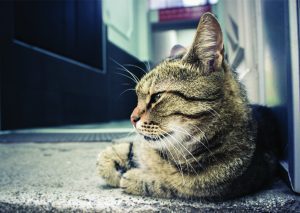By Dr. Marc Havig
 Gabby presented to the surgery service at Animal Specialty Hospital of Florida (ASH) as a six-month-old domestic shorthair kitten for evaluation of a heart murmur secondary to a congenital heart defect known as Patent Ductus Arteriosus (PDA). “Spay-N-Save” – a non-profit organization – rescued the stray kitten outside of Orlando in Longwood, Florida. Gabby’s veterinarian diagnosed her with a holosystolic heart murmur on a routine physical examination, and then confirmed her PDA via an echocardiogram. At that point, her veterinarian referred her to the surgery specialists at ASH for an advanced surgical procedure to correct her PDA.
Gabby presented to the surgery service at Animal Specialty Hospital of Florida (ASH) as a six-month-old domestic shorthair kitten for evaluation of a heart murmur secondary to a congenital heart defect known as Patent Ductus Arteriosus (PDA). “Spay-N-Save” – a non-profit organization – rescued the stray kitten outside of Orlando in Longwood, Florida. Gabby’s veterinarian diagnosed her with a holosystolic heart murmur on a routine physical examination, and then confirmed her PDA via an echocardiogram. At that point, her veterinarian referred her to the surgery specialists at ASH for an advanced surgical procedure to correct her PDA.
PDA is the most common congenital heart defect in dogs, but it can also occur much less commonly in cats. It results from failure of closure of the ductus arteriosus, which is a normal embryonic vessel extending from the main pulmonary artery to the descending aorta that allows blood flow to bypass the non-functional fetal lungs. Normal ductal closure typically occurs within the first few hours following birth. Failure to close results in a left-to-right shunting of oxygenated blood back into the pulmonary circulation. The left side of the heart experiences volume overload, resulting in left-sided heart enlargement and/or dilation. In most cases, the cardiac changes are reversible, but permanent changes can occur in patients older than 16 weeks.
Without treatment, most affected animals will develop heart failure before one year of age. In some cases, right-to-left shunting can occur from chronic pulmonary circulation overload or from persistent fetal pulmonary hypertension.
Once a diagnosis is confirmed, treatment requires either surgery to ligate and close the PDA, or in larger patients, endovascular coil placement. Veterinary surgeons should perform their selected treatments soon after diagnosis in patients older than eight weeks of age.
In most cases following surgery, the prognosis is good to excellent with a return to normal heart size.
Gabby recovered well from her procedure, and we discharged her from the hospital the day following her surgery. She has since been adopted by a family in the Orlando area, and she is doing excellently!
Dr. Marc Havig, Diplomate, American College of Veterinary Surgeons, is a surgeon and owner at Animal Specialty Hospital of Florida. He is the Vice President of the Collier County Veterinary Society, and he received his Canine Rehabilitation Certification in 2010. Dr. Havig specializes in small-animal surgery and has a special interest in canine sports-related injuries.
10130 Market Street, Naples, FL
239.263.0480 | www.ASHFL.com









